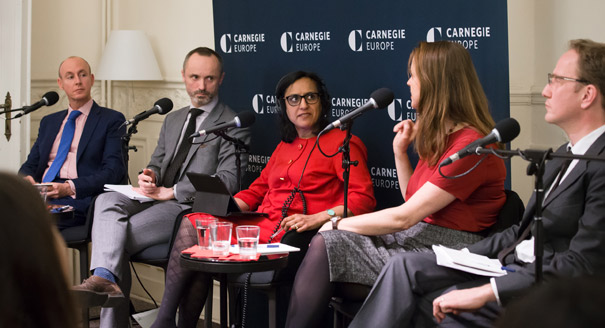Registration
You will receive an email confirming your registration.
This event was recorded and broadcasted as a special edition of the World Tonight on BBC Radio 4.
<
An unprecedented mix of crises has converged in Europe, creating extraordinary challenges for the continent. Brexit, an increasingly unpredictable Russia, the ongoing eurozone crisis, significant migratory challenges, increasing populism, the rise of Euroskepticism, and a testing time for transatlantic relations all threaten to weaken the EU—if not tear it apart.
New and innovative ways of rebuilding European cooperation are needed to keep Europe’s post–World War II achievements of peace and prosperity intact. As the underpinnings of the international order are shaken up, will the EU opt for a breakup, an ever-looser union, a two-speed union, or a consolidation of its existing framework?
In partnership with BBC Radio 4, Carnegie Europe co-hosted a discussion outlining these converging challenges and the possible best- and worst- case scenarios that could play out in Europe in the coming years.
Ritula Shah, a presenter of The World Tonight on BBC Radio 4, moderated a discussion featuring Heather Grabbe, director of the Open Society European Policy Institute; Daniel Hannan, member of the European Parliament; Tomáš Valášek, director of Carnegie Europe; and Guntram Wolff, director of Bruegel.
This event was organized in partnership with BBC Radio Four.
Heather Grabbe
Heather Grabbe is the director of the Open Society European Policy Institute. Follow her on Twitter @HeatherGrabbe.
Daniel Hannan
Daniel Hannan is a member of the European Parliament. Follow him on Twitter @DanielJHannan.
Tomáš Valášek
Tomáš Valášek is the director of Carnegie Europe. Follow him on Twitter @valasekt.
GUNTRAM WOLFF
Guntram Wolff is the director of Bruegel. Follow him on Twitter @GuntramWolff.
Ritula Shah
Ritula Shah is a journalist at BBC Radio 4, where she presents The World Tonight and the political panel program Any Questions. Follow her on Twitter @ritula.

